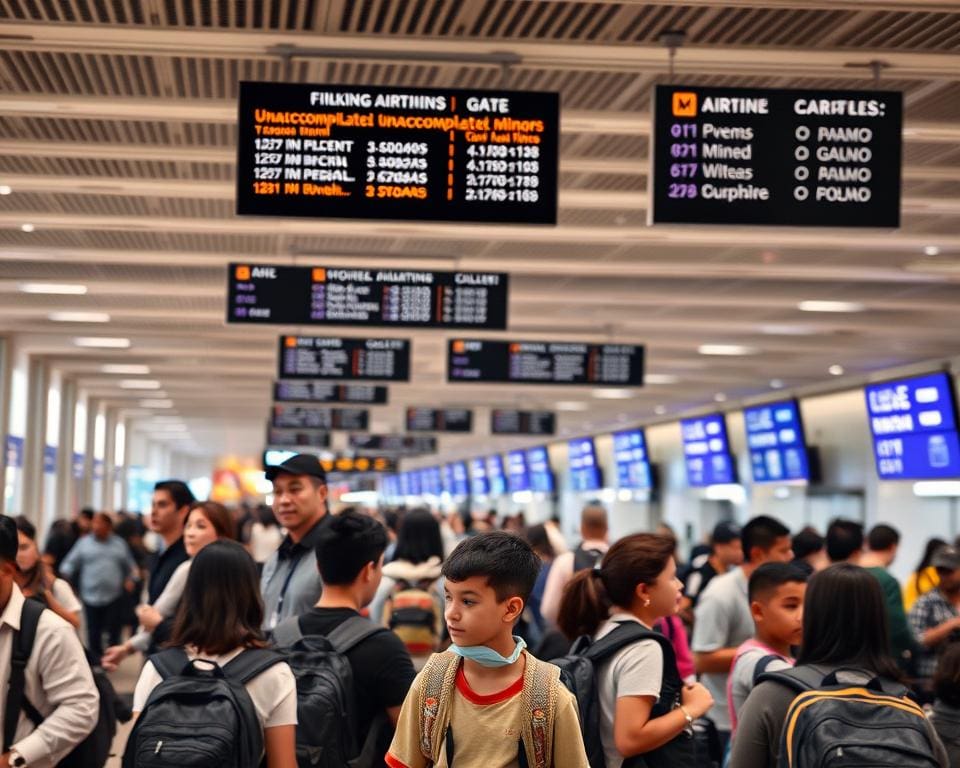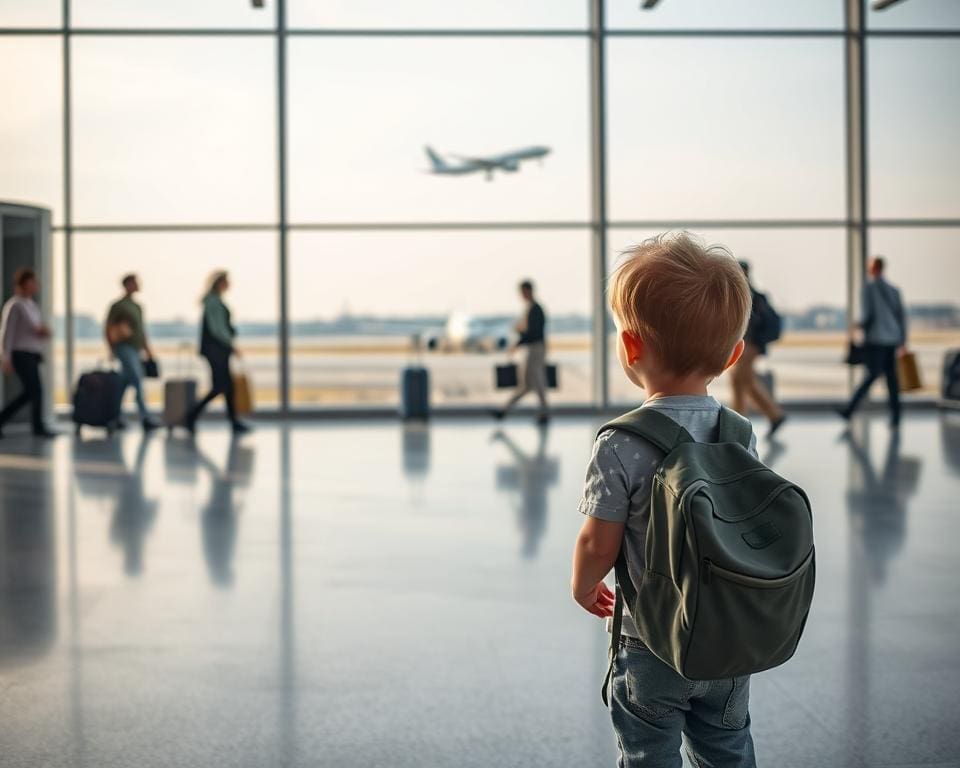For many parents, the idea of their child travelling alone can evoke mixed feelings of excitement and concern. Understanding the unaccompanied minor policy is essential for parents considering this step. So, at what age can you travel alone on a plane? The answer is not universal, as age requirements for solo flights vary significantly between airlines. In this section, we will delve into the key factors influencing your child’s readiness for independent travel, guiding you to make informed decisions.
Understanding Unaccompanied Minor Policies
The unaccompanied minor policy is crucial for ensuring the safety and wellbeing of children travelling without an adult. This policy varies among airlines, but it generally aims to provide a structured and secure travel experience for minors. When parents book flights for their children, understanding these policies can significantly enhance the travel experience.
Many airlines have established specific procedures designed to care for unaccompanied minors. Check-in often includes special protocols, allowing for smoother transitions. In-flight supervision ensures that children are monitored throughout their journey, providing parents with peace of mind. Post-flight arrangements are just as important, as they guarantee that the child is safely handed over to the designated caregiver.
Awareness of airline rules for minors flying alone helps parents prepare adequately for travel. Meeting the requirements set forth by the airline fosters a sense of confidence in both the child and the parents. In many cases, airlines require forms to be filled out and identification to be presented, establishing a clear communication channel about the traveler’s needs and ensuring that all necessary precautions are taken.

At What Age Can You Travel Alone On A Plane
When considering air travel for children, understanding the age requirements for solo flights is crucial. These regulations can vary significantly across different airlines. Generally, parents should familiarise themselves with the specific rules concerning children flying solo age restrictions, as these details play a vital role in ensuring a safe travel experience for young passengers.
Overview of Age Requirements
The age requirements for solo flights typically start as early as five years old when airlines offer designated unaccompanied minor programs. Children within this age range are allowed to travel alone, provided they are enrolled in such a programme, which ensures proper supervision throughout the journey. Usually, these programmes cater to children aged 5 to 11, although older minors can often fly unaccompanied under less stringent regulations.
Differences Among Airlines
It is essential to note that different airlines have varying policies regarding age restrictions for solo flying. While some airlines permit young passengers as young as five to travel alone, others may set the minimum age at six or seven. Additional differences may include additional fees for unaccompanied minor services and specific guidelines for pick-up and drop-off procedures. Parents are encouraged to review each airline’s rules, keeping the children flying solo age restrictions in mind when making travel plans.
Airline Rules for Minors Flying Alone
Understanding the specific requirements and regulations regarding minors flying alone is crucial for parents planning to send their children on solo trips. Each airline has distinct policies that address the safety and wellbeing of unaccompanied minors. Familiarity with these airline rules for minors flying alone can ease concerns and ensure a smoother travel experience.
Understanding Airline Regulations
Airlines set regulations to safeguard minors during flights, which include designated assistance at various stages of travel. Important elements of these regulations often encompass:
- Age requirements for travel alone
- Service fees associated with unaccompanied minor programmes
- Support services available during the journey
Popular Airlines and Their Policies
In the UK, popular airlines and their policies differ significantly. Notable airlines like British Airways, easyJet, and Ryanair implement varying protocols to accommodate young travellers:
- British Airways: Provides dedicated staff to assist unaccompanied minors, ensuring they are escorted through security and boarding processes.
- easyJet: Allows children aged 14 and over to fly alone but offers support only upon request.
- Ryanair: Permits children aged 16 and older to travel alone without specific unaccompanied minor services.
Children Flying Solo Age Restrictions
Understanding the children flying solo age restrictions is essential for parents planning air travel for their little ones. Different airlines impose specific age thresholds that dictate when a child can fly unaccompanied. These restrictions are crucial as they aim to protect young travellers during their journey.
Most airlines require that children under a certain age use an unaccompanied minor service. This service often includes assistance from airport staff, ensuring the child is safely boarded, transferred, and met at their destination. The solo minor air travel regulations typically vary, with some airlines accepting children as young as five, whilst others may set the minimum age at eight or even ten years old.
Moreover, age restrictions not only guarantee safety but also influence how parents execute their travel plans. Understanding these guidelines helps in managing expectations and preparing children for the adventure of flying solo. As regulations can differ significantly among airlines, thorough research will empower guardians in making informed decisions.
Importance of Preparing Your Child for Air Travel
Preparing your child for air travel plays a vital role in ensuring a smooth journey. It is essential to discuss their expectations and help them manage any anxieties. Building a sense of responsibility in children can significantly enhance their travel experience. By instilling confidence, parents pave the way for a more enjoyable flight as their child navigates the airport independently.
Building Confidence for Solo Travel
Confidence is key when it comes to kids flying alone. Engaging in conversations about what to expect during air travel can alleviate fears and encourage excitement. Share stories of your own flying experiences, highlighting what is enjoyable about flying solo. The importance of preparing your child for air travel cannot be overstated; it helps children feel equipped for the adventure that awaits them.
Essential Tips for First-Time Flyers
For first-time flyers, certain tips can make a significant difference in their travel experience. Consider implementing the following strategies:
- Familiarise them with airport procedures such as check-in and security checks.
- Conduct practice runs to simulate the experience, educating them on vital information like boarding announcements.
- Encourage them to carry a small backpack with snacks, entertainment, and a favourite toy for comfort.
- Discuss the importance of listening to airline staff and following instructions.
- Foster independence by allowing them to make small decisions, like choosing their seat or snack.
Understanding kids flying alone guidelines enables children to embrace their journey, transforming apprehension into excitement. With thorough preparation, your child’s first solo travel can be a memorable milestone filled with joy and adventure.
Solo Minor Air Travel Regulations
Understanding the solo minor air travel regulations is crucial for ensuring a safe and enjoyable journey for young travellers. These regulations outline the unaccompanied minors procedures that airlines implement to provide a protective framework while minors fly alone. Knowing what to expect can significantly ease concerns for both parents and children.
Safety Procedures for Unaccompanied Minors
Airlines have structured safety procedures specifically designed for unaccompanied minors, ensuring that young passengers are well-cared for throughout their travel experience. Key procedures include:
- Check-in Procedures: Parents must complete a detailed check-in process that includes providing identification and contact information. This ensures that airline staff are aware of the unaccompanied travel arrangements.
- Escorting to the Gate: Airline staff typically escort minors through security and to the departure gate, minimising the chance of them getting lost or missing their flight.
- Boarding Protocols: Special boarding procedures are in place, allowing unaccompanied minors to board the aircraft first, providing a smoother transition and reducing anxiety.
- During the Flight: Flight attendants are trained to monitor and assist unaccompanied minors during the flight, ensuring they feel comfortable and secure.
- Arrival and Hand-off: Upon landing, airline personnel oversee the safe transfer of the minor to the designated adult, completing the journey with care.
Effective communication between parents and airline personnel plays a vital role in the success of these unaccompanied minors procedures. Clarity regarding pick-up points and contact numbers helps in creating a seamless travel experience. With these solo minor air travel regulations in place, both children and parents can embrace the excitement of flying alone with confidence.
Kids Flying Alone Guidelines
The prospect of children flying alone can be both thrilling and daunting for parents. To ensure a safe and pleasant experience, it is crucial to follow important kids flying alone guidelines. First and foremost, having all essential documents in order, including identification and flight information, cannot be overstated.
Understanding the airport layout helps children navigate the terminal with confidence. Familiarising them with signs, boarding gates, and meeting points contributes significantly to their sense of security. Communication is vital, so providing a mobile device for contact during travel ensures peace of mind and maintains an open line with parents.
Familiarising your child with unaccompanied minors procedures is essential for a smooth journey. Encourage them to ask airport staff for assistance when needed. This empowers them to take responsibility for their travel while knowing help is readily available. With these guidelines, children can embrace their independence while ensuring their safety during air travel.
Flying Solo Age Limitations
Understanding the flying solo age limitations is essential for parents and guardians planning air travel for their children. Most airlines allow minors to fly alone starting at age 5, but this can vary significantly from one carrier to another. For example, whilst British Airways permits unaccompanied travel from 5 years old with specific services, easyJet requires that children be 14 or older to travel unaccompanied without restrictions. Familiarising oneself with these solo minor air travel regulations is crucial for a smooth journey.
It is important to note that age limitations are not the sole aspect; airlines also impose accompanying guidelines and safety measures to ensure the well-being of young travellers. Parental involvement remains vital, with parents needing to assess whether their child is mature enough to navigate potential challenges during their flight. Informed preparation is key to fostering a sense of security for both parents and children involved in solo flights.
Ultimately, staying updated on the evolving policies of various airlines is paramount. As regulations may change, parents must remain vigilant when booking flights for their children, ensuring that their choices reflect both safety and suitability. By understanding these flying solo age limitations, families can embark on exciting journeys, opening doors to exploration and independence for the next generation.









